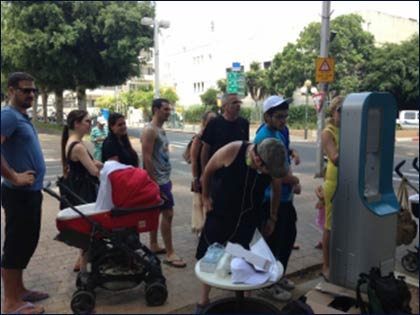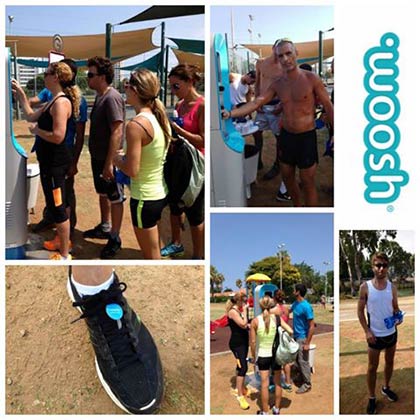By Rivka Borochov
Sophisticated cities in North America and Europe are banning plastic bottles to cut down on waste. But what happens when water bottles are gone from the supermarket shelves and your reusable bottle runs dry while you are out and about?
A young Israeli company has a plan to offer water refilling stations in cities everywhere.
Woosh Water Systems, founded in 2010, is developing a system where you’ll swipe a chip, put in your bottle, and within a minute get a clean, cold refill. It is a high-tech replacement for public water fountains that most people are loath to use for safety and hygiene reasons, says CEO Itay Tayas Zamir.
Tel Aviv, where only 14 percent of people use the public water fountains, agreed to be the Woosh pilot city for the world. Seven dispensing stations were installed in central Tel Aviv, and some 5,000 people registered through the Internet and received their free chip, entitling them to unlimited and free refills of cold water.
“It’s our aim to give people the option to refill their own bottle and not to buy more plastic bottles when they are out on the street. We are focusing on the public and not the private space,” Tayas Zamir says.

Lining up for a refill at a Tel Aviv Woosh station “Every plastic bottle you save, you help the environment in the sense of reducing the carbon footprint of the city, of the community you live in, and reducing the carbon footprint individually.”
Water for UN forces and everybody else
The idea came about when Tayas Zamir was a fellow at the Heschel Center for Environmental Learning and Leadership in Tel Aviv. He’d planned to develop another idea as an entrepreneur, but soon realized that Woosh could make a bigger impact on the world in a number of ways.
Woosh formed an alliance with strategic partner Odis Filtering Ltd. , an Israeli company that already cleans city water on a large scale.
A disinfection system cleans your bottle and the system itself, every time it’s used, with the help of a non-polluting ozone purification technology. The ozone is taken right from the water, meaning no waste or chemicals are going down the drain.
The system can be tailored to filter out any number of contaminants –– like iron in Washington, DC, where few people drink the tap water, or bacteria. Every Woosh system can also be customized to reduce heavy metals and pharmaceuticals from the local water source.
So promising is this Israeli technology for cities globally that it was chosen to represent Israeli water technologies on Israel's 65th Independence Day at the UN headquarters in New York City as part of the "65 Years of Israeli Innovation” presentation.
Israeli Ambassador Ron Prosor explained to visitors how Odis has been providing the UN forces with drinking water in areas that are poorly developed, and now Woosh, with Odis, can make city water drinkable with the press of a button.

You can keep the chip on your shoeFor those wary of public fountains
Tayas Zamir says the question of charging a fee will be up to the individual municipalities that adopt the system. The cost is borne either by users or by the city; municipalities could recover the expense of the machine and maintenance through advertising.
When Tayas Zamir was at the consulting stage, he was surprised to learn that people in Israel’s Environmental Protection Ministry were in favor of charging people money to use the water dispenser –– because people need to be made more aware of the cost of water and the need to conserve this precious commodity in a dry country.
He points out that many European cities have public fountains and yet people continue buying bottled water.
“Even in Switzerland, where there are clean fountains in every village and great water, it’s still in the top 10 in the world for bottled water consumption,” says Tayas Zamir. “Or let’s take Rome: They have tons of running water from fountains available 24/7 and still they are number one in Europe per capita in bottled water consumption.
“This is who we are targeting – people who don’t use the fountains,” Tayas Zamir says.